Feline Acne is
a condition that can be found in cats of any age (or breed), but is most commonly
found in older cats. It is almost always found on the chin and lower lip, where
the hair follicles become clogged. Food and chemicals sensitivities, hyperactive sebaceous glands, stress, poor grooming habits or a compromised immune
system can be contributing factors. If your kitty has bumps on the chin or lip, it is important to seek out the advice of your veterinarian to rule out other causes such as yeast or ringworm and also because the area can become infected.
3 Holistic Tips For Feline Acne:
- Disinfect the area daily with topical treatments that can be obtained from your veterinarian.
- Change your cat's diet to a hypoallergenic, grain-free diet to help reduce inflammation. Avoid dry food as it is high in starchy carbohydrates.
- Support your cat’s immune system with supplements. Using the Immune Support Kit and Power Probiotic for Pets can help.


















